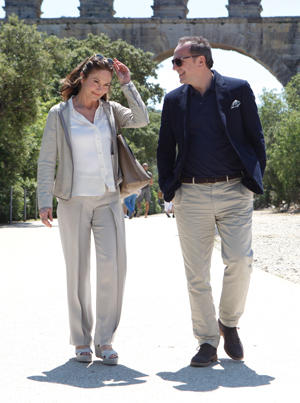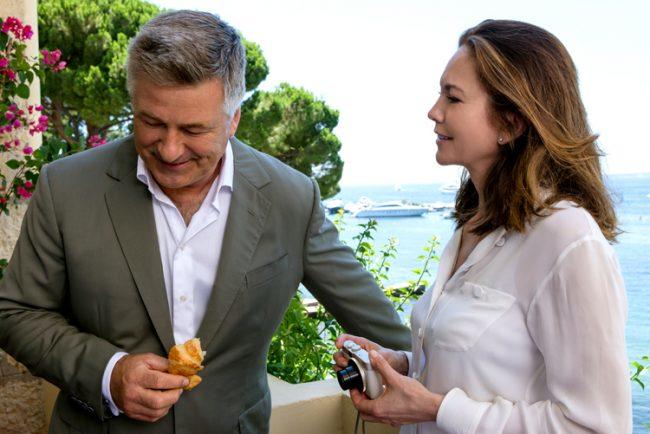Diane Lane has made a career acting out other people’s wildest fantasies on screen: cheating on a husband with a younger man, moving spontaneously to Tuscany and fixing a crumbling villa, kissing Richard Gere or even just looking like Diane Lane.
So when I meet the woman herself in a decidedly un-fantastic WeWork conference room, complete with dizzying purple and pink wallpaper, florescent lighting and no windows, it feels kind of wrong. As far as offices go, it’s actually a pretty nice one, but it’s not a place where fantasies happen. And it’s not a place for Diane Lane.
“We should be sitting out in the park with the breeze and the sunshine and I’d be a lot more inspired,” she says. “I’m sorry, it’s like the most beautiful day in Manhattan and here we are in this room.”
We’ve come to this WeWork location, where her publicist has an office, to discuss Lane’s new — and far more glamorous — movie, “Paris Can Wait.” It is the first feature film directed by Eleanor Coppola, the 81-year-old wife of Francis Ford Coppola, who was best known before this for her documentary about the making of “Apocalypse Now.” Lane plays the lead, an American woman who goes on an adventure with her neglectful husband’s French business partner, taking a road trip from the Cannes Film Festival to Paris. Wine, beautiful scenery, a touch of tragedy, romance and lots and lots of carbs ensue.
Those carbs, I learn, have left their mark on the 52-year-old actress. The first thing she does when we start discussing the movie is grab her stomach and point to it. “Yes, I still have my, what do they call it? The college 15? Freshman 15? What do they call it when you make a movie about croissants and then you eat them and then you’re stuck like this?”

Lane with French actor Arnaud Viard.
She was able to indulge in more than just croissants while filming the movie, she says, noting that Coppola wanted the actors toreally enjoy their surroundings and be engaged with what was happening around them, which is unusual.
“Oftentimes in my lucky employment, I’ll be in a place that’s very attractive or very famous, and you really want to share it. And you’re working in that environment so you don’t really get to experience it. People get all jealous and they think, ‘So, biatch, how was Tuscany today?’ I just say, ‘Wait a minute! I was working from before sunup till after sundown. And I can’t eat the food because of the timing or whatever. It’s just not what you think.’ You get like five minutes off to look around, realize you’re in beauty and then hustle on with your day of work.”
Lane speaks in a lovely, meandering way, unusual for a native New Yorker. A question about the Cannes Film Festival leads her to a memory of being on a private plane, which leads her to thinking about other fancy experiences in her life, which leads her to this specific memory: “I had a white truffle wedding cake one time. It wasn’t at my wedding, but somebody made a white truffle wedding cake; I was at their wedding. And I thought: ‘This is pretty decadent.’”
When I ask Lane where she’s staying in the city while she attends her movie’s New York City premiere, she’s not precisely sure.
Lane is well aware that a movie about rich
white people exchanging lustful looks
in France over chocolate cake
seems somewhat frivolous.
“I’m a native New Yorker, public school, dad drove a cab. But once I’m out of the numbers, I might as well be in Istanbul,” Lane responds. (She was staying Downtown.)
Though she lives in Los Angeles now, Lane lived in New York until she was 19 years old. As a child, she acted in theater productions — like Joseph Papp’s version of “The Cherry Orchard” with Meryl Streep — and attended Hunter College High School.
Whenever she visits, Lane says she is “discomfited” to learn that a favorite store or location has closed (I have the sorry job of informing her that FAO Schwarz is indeed no more).
“You take everything personally if you’re native to a certain place, or if you have memories that are associated with it.” But she says, it helps her appreciate the few institutions and stores she loves that are still around. “If I see something’s the same, I’ll feel like, ‘That’s right, it was fabulous then and it’s still fucking fabulous now!’”
Lane is well aware that a movie like “Paris Can Wait” about rich white people exchanging lustful looks in France over chocolate cake seems somewhat frivolous when there is so much troubling news in the world. That thought bothered her, she says, until Coppola reminded her that a little escapism at the movies isn’t such a bad thing.
“It’s a reprieve from the news and the guilt and the horror and the reality that is real life. It’s a fairy tale for grown-ups,” she says.
Not all grown ups, I would argue, but grown women. Women who find themselves becoming less and less desired by their husbands (represented in “Paris Can Wait” by the champion charming jerk, Alec Baldwin) and increasingly invisible to other men.

Alec Baldwin plays Lane’s husband, Michael Lockwood.
Coppola says that Lane’s age was part of the reason she cast her. “I wanted an actress who was age 50, not someone who was a different age, playing 50…It was a joy to get to know her at this point in her life.” And Coppola said she appreciated Lane’s “courage to take a risk with a first-time director.”
In “Paris Can Wait,” Lane’s love interest (played by the French actor Arnaud Viard) is a man who seems like the grown-up version of the guy you dated on your summer abroad. Romantic, doting and probably a little sleazy behind his accent. Maybe Lane’s character will date him, maybe she won’t — the film is ambiguous on this point — but the important thing is that she has the option. She can make a bad choice if she wants to, and that alone is fantasy enough (as is the idea that a woman can eat all that bread and not gain weight).
Lane is a bit cagey when it comes to discussing women in Hollywood. When I ask her point-blank if she’s tired of the topic, she admits, “Well, you see it on my face, I’m sure. I don’t mean to be. I’m highly transparent against my will.”
Still, she is a good sport and indulges me a little. She’s certainly been in the business long enough to have a few opinions on the topic. When she was 14, Time magazine ran her on its cover as one of “Hollywood’s Whiz Kids” after she starred in the hit “A Little Romance” with Laurence Olivier. Since then, she’s worked consistently and was nominated for an Academy Award for best actress in 2003 for her role in Adrian Lyne’s “Unfaithful” with Richard Gere.
And like any actress, she’s faced her share of objectification. The male writer of a 2007 profile in Esquire described her “as a pleasant beauty, more pretty-mom-next-door than jaw-drop virtuoso, a porcelain doll awaiting paint, an idle daydream”; when she was 18 years old, Johnny Carson joked about the “sexual attraction going on between us.”
“Being a woman … there’s a type of fashion, glamour, appearance-driven value that I don’t know if men experience,” she says.
Lane is hopeful for the future, though, and takes inspiration from her 23-year-old daughter (also named Eleanor), women like Eleanor Coppola, as well as other actresses her age who are still acting in great roles. “I’m inspired by their success and I feel empowered by their success, because any woman’s success is my success.”
She’s been watching Ryan Murphy’s “Feud: Bette and Joan,” and says that the industry has come a long way since the days when actresses fought one another for every hint of recognition.
Of course, there is another possibility. “Maybe I’m naïve and want to see things as not as vicious as they really are, which is entirely possible,” she acknowledges.
I tell her maybe she’s just lucky she never experienced a similar viciousness. She considers that a moment and responds, “Yes, that’s true. I was never propositioned on a casting couch.”
Lane has more movie projects on the horizon; she’s reprised her role as Martha Kent in the new “Justice League” film, set to come out in November, and will be playing Audrey Robinson, the wife of Mark Felt, (aka “Deep Throat”) opposite Liam Neeson in the film “Felt.”
In the future, though, she is interested in an entirely different venture: directing films. Particularly, comedic films. “I think we need more of them right now. It’s very healing and it implies a level of intelligence. And hopefully incorporates empathy and humanity,” she says. “Humor is a great way to never proselytize but just offer up something for people to see and leave it at that.”
That sentiment describes Lane’s own attitude toward mixing politics and fame very well; she says she admires the gestures that some actors have made speaking out about politics, but she isn’t sure she’s ready to do the same — at least not explicitly.
“I’m still kind of on the fence about that. Do I want to shoot my mouth off? Do I really care about demographics in terms of who agrees with my politics? Those are interesting topics. How important is it to me if I lost some business because of my politics? Do you want to be loved or do you want to be right?” She laughs. “That’s why I’m single, baby!” (Lane was married to Christopher Lambert from 1988 to 1994 and Josh Brolin from 2004 to 2013).
In her career, at least, Lane seems to have opted for being “loved” over being “right.” And I really can’t fault her for it; after all, is there really anything so wrong about watching a beautiful woman have a beautiful experience in France for a couple of hours, without the ugliness of reality seeping in? Fantasy needs to live beyond the realm of politics, and maybe Diane Lane — the professional Diane Lane, at least — does too.
After 45 minutes of talking, Lane’s publicist returns to our sad conference room and tells me to wrap up the interview. She and Lane have some more work to do in the office today.
“Can we find a room with a window?” Lane begs her. “It’s like being in a storage facility in here.”
Her publicist promises she will look into it. Five minutes later, she returns to deliver some happy news: She has found a windowed room. Ecstatic, Lane gathers up her things, wishes me a warm goodbye and leaves behind the dreary corner space.
A romantic, whirlwind trip around France with a handsome lover is a wonderful fantasy to daydream about. But it’s also OK to settle sometimes for an office with a window on a beautiful Manhattan day.
